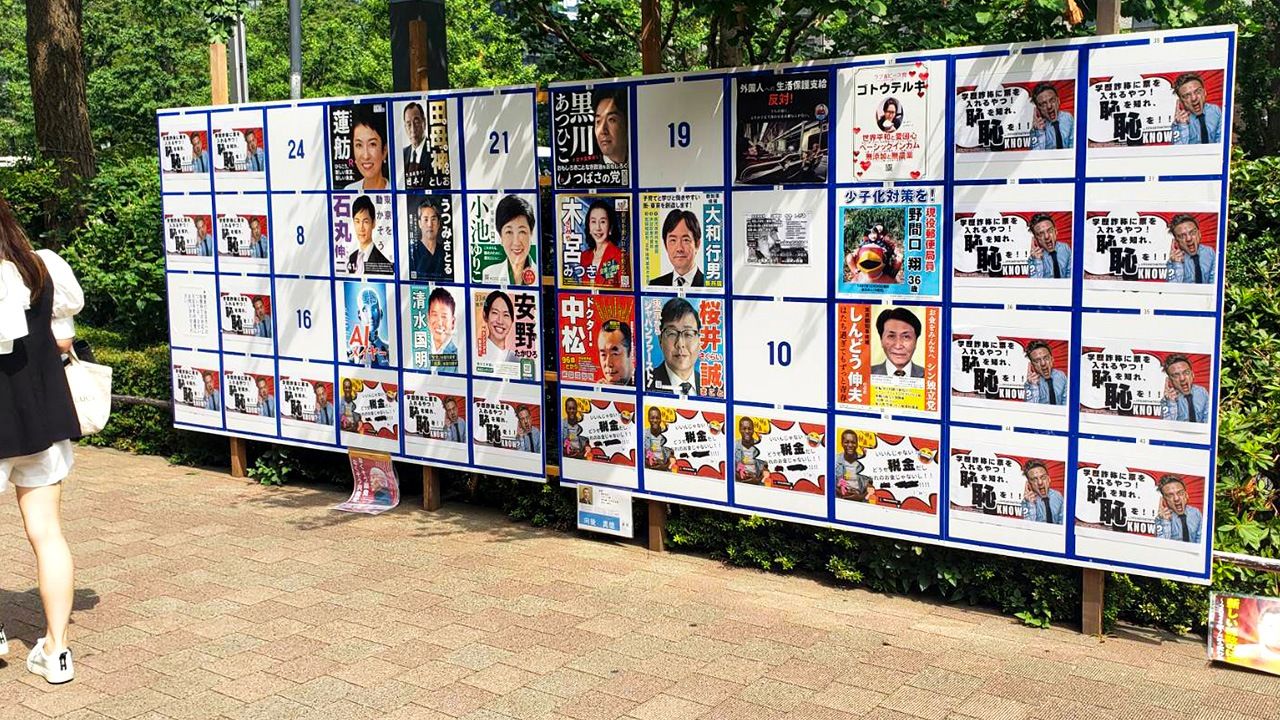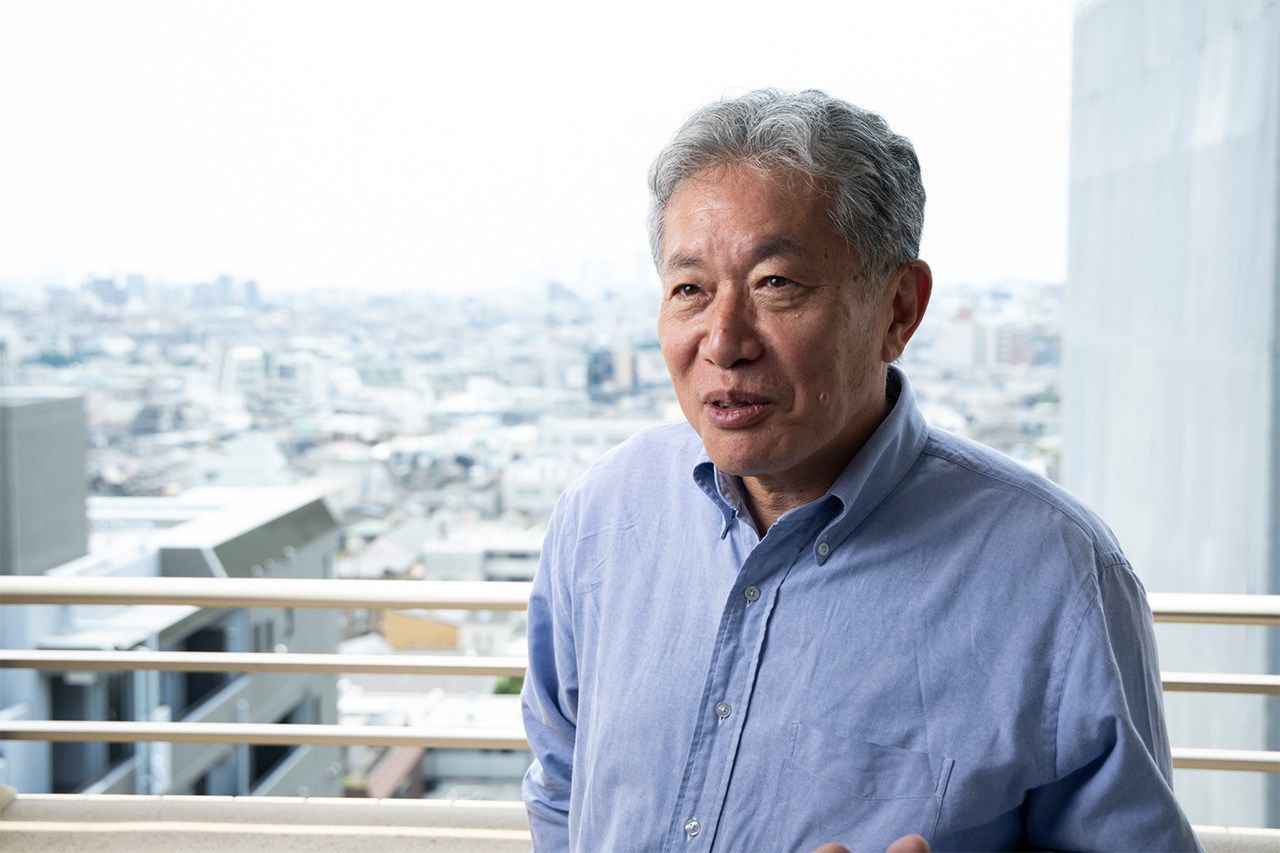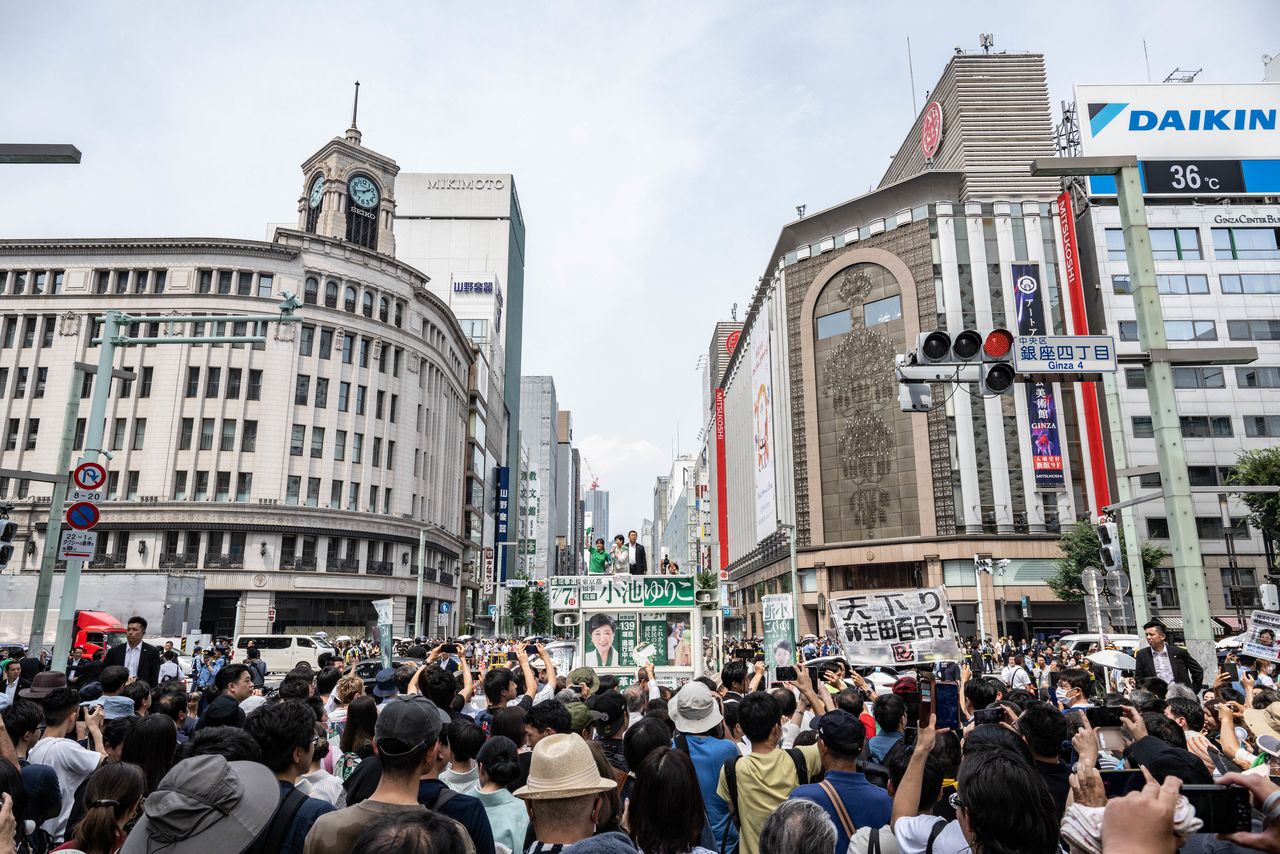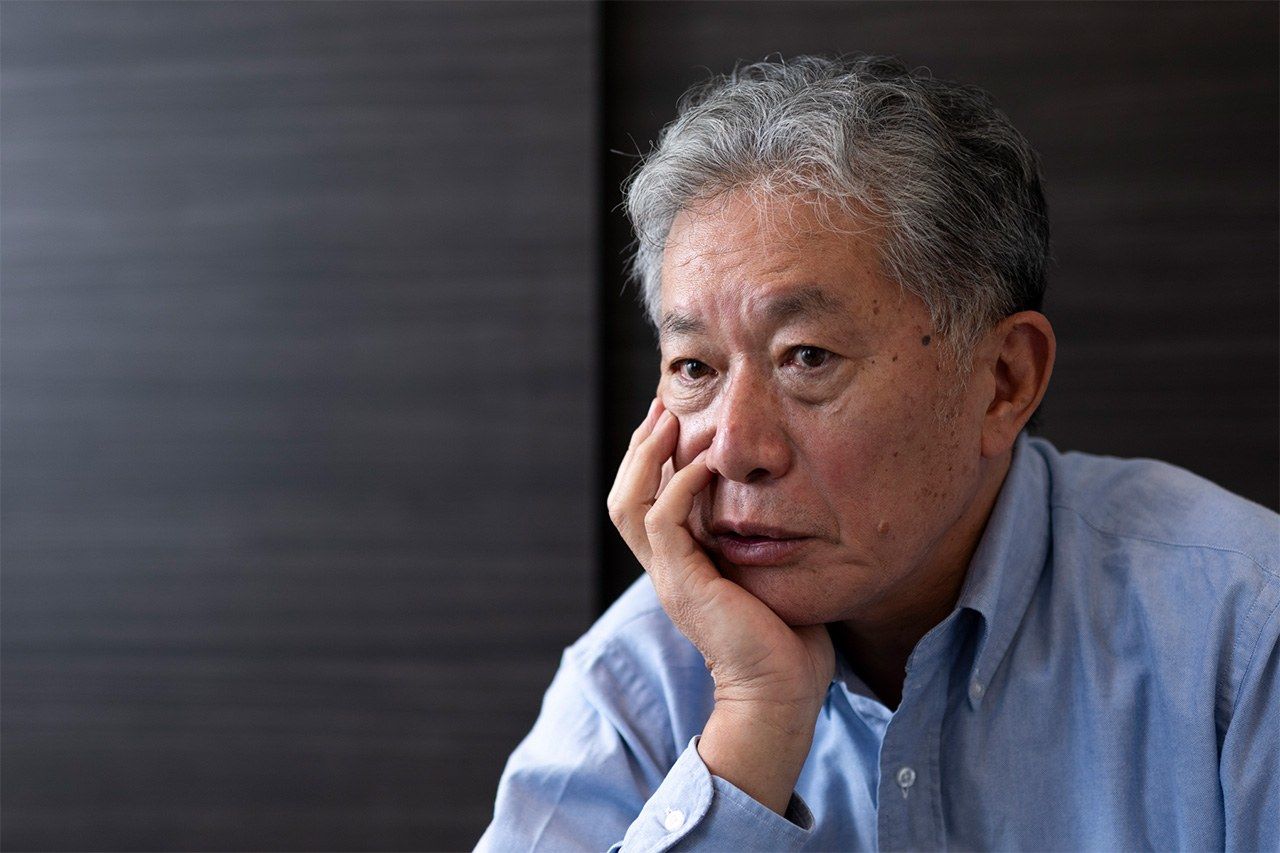
Democracy Devalued: A Philosopher’s Call for Political Maturity
Politics Society- English
- 日本語
- 简体字
- 繁體字
- Français
- Español
- العربية
- Русский
Hacking the System
From the July 7 Tokyo gubernatorial contest, I sensed that the idea elections are the foundations for democracy is crumbling. Japan seems to be losing the basic understanding that elections are a valuable opportunity for voters to send their representatives to positions where they can create legislation.

Uchida Tatsuru speaking in Tokyo. (© Kawamoto Seiya)
While there could only be one governor, the “Party to Protect the People from NHK,” commonly known as the NHK Party, fielded 24 candidates, including those from affiliated groups. Then, it “hijacked” the official poster boards by using the same images in all 24 of its spaces, and even allowing people who made a certain level of donations to put their own posters there. This led to the appearance on boards of people with no connection to the election, as well as pictures of animals and QR codes linking to websites. Candidates not representing the NHK Party also took some unbelievable actions, such as one who displayed a poster with an indecent nude image and the phrase, “Stop restrictions on freedom of expression.” Including the official designated broadcasts for conveying their political opinions, many candidates used the election simply as a publicity stunt and a moneymaker, such as by drawing attention to themselves to build up their following on video websites or other social media.
The Public Offices Election Act is just one of our many social systems that are designed and operate under the assumption that human nature is fundamentally good or that citizens will generally behave sensibly. But such systems are full of holes, and when they are “hacked” it is easy to ensure personal benefit. Taking advantage of elections, where candidates are assured of various special privileges, one can pursue self-interest and ridicule representative democracy itself. The Tokyo election made this plain; today, a belief in innate goodness seems unsustainable.
Abe as Instigator
However, I think this level of disdain for elections derives from the dismissive attitude toward Japan’s national legislature of three successive Liberal Democratic Party administrations from 2012, led by Abe Shinzō, Suga Yoshihide, and Kishida Fumio.
Japan’s Constitution defines the Diet as “the highest organ of state power,” but governments since Abe came to power have done their utmost to set themselves above the legislature. As a result, weighty matters fundamental to national politics have frequently been decided by the cabinet without parliamentary debate, and legislation vehemently criticized by opposition parties has been steamrollered through. The LDP has been particularly intent on making debate in the Diet appear to be nothing more than a meaningless ceremony.
Abe repeatedly made the mistaken statement, “I’m the head of the legislature.” This probably betrayed his belief that the president of the ruling party, with a majority of seats, can freely create legislation. However, a political system in which the head of the legislative branch, which makes laws, is also the leader of the executive branch, which carries them out, is called a dictatorship. Thus, Abe was repeatedly denying the spirit of democracy in a statement with the meaning, “I’m a dictator.”

Citizens listen to a campaign speech by Governor Koike Yuriko in Ginza, Tokyo, on July 6, 2024. (© AFP/Jiji)
Mocking Democracy
The most effective way to create a dictatorship under the present Constitution is to reduce the prestige of the legislature. If many voters hold the impression that “the Diet isn’t functioning,” “parliamentary debate is just an empty ceremony,” or “lawmakers prioritize their own interests over representing the electorate,” then democratic government is essentially finished.
This is why the LDP has made such extensive efforts over the past 12 years to implant the impression that lawmakers—including those from its own party—may be intellectually and ethically inferior to ordinary citizens. And it has succeeded. By creating large numbers of lawmakers with below-average intelligence and ethics, the LDP has become unfit as a ruling party, but has achieved a remarkable success in trampling the prestige of the legislature.
This has led to the current electoral reality, in which people who mock representative democracy set themselves up as candidates, and there are no small number in the electorate who vote for them. The NHK Party has been particularly intent on lowering the prestige of the Diet and the authority of lawmakers, through such stunts as sending GaaSyy (Higashitani Yoshikazu), a scandal-seeking YouTuber, to the House of Councillors. (Later, after his expulsion from the Diet, the former lawmaker was convicted for intimidation.) The party did not invent the idea, however; it has merely accelerated the game that the LDP began.
Ishimaru Shinji, who finished second in the Tokyo election, repeatedly clashed with the municipal assembly in his former position as mayor of Akitakata, Hiroshima Prefecture, making waves online for his continued insistence that the assembly was not functioning. This is another faithful rendering of the desire for dictatorship embodied by Abe, which sees the executive and legislative branches as in conflict, and argues the executive should be superior.
Nippon Ishin no Kai (Japan Innovation Party) is no different. Proposing a reduction in the number of lawmakers sounds like a rational policy for cutting unnecessary costs, but it is really just the belief that having representatives of various political positions discuss matters in parliament is a waste of time, and that all power should go to the leader.
Calling for Political Maturity
The LDP factions kickbacks scandal exposed the truth that representatives were using their positions to blithely break the law. It simultaneously conveyed the messages that Diet members were not good people, thereby hollowing out democracy, and that those who are close to the government are not punished even if they do something illegal, hollowing out the rule of law.
Those who take these messages as a warning will think that “things can’t continue like this,” and target political reform, but those who see them as a report on the current state of affairs will be consumed by a sense of emptiness, viewing democracy as over. A considerable number of Japanese also seem to have accepted the news of the scandal with a resigned take that “this is how the world is.”
Winston Churchill once said that “democracy is the worst form of government except for all those other forms that have been tried from time to time.” Why is it “the worst”? Because it is an extremely difficult system to use. It rests on the premise that there are many rationally thinking citizens. If a large number of voters are not serious adults, it can easily descend into mob rule. Democratic government urges people to act like adults, and is the only political system to call for political maturity from citizens.
Imperial, monarchical, aristocratic, and oligarchic regimes are all cheaper to run when citizens are childish or stupid. For this reason, they tell citizens not to grow up, conveying such sweet words to the people as, “There’s no need to think about anything difficult. We rulers will do all the thinking for you, so you can remain stupid as you are.” In the Chinese classic Shiba shilue (Eighteen Histories in Brief), the old man who praises the peace and prosperity of the times, bragging that imperial power has nothing to do with the common people, is the ideal fool who does not even realize that he is ruled.
Only democracy does not pamper the people, instead imposing the bothersome task on them of acting like adults. This is why it faces such hatred.

Uchida Tatsuru calls for maturity in politics. (© Kawamoto Seiya)
Cat and Mouse
To prevent a recurrence of the chaos of the Tokyo election, some suggest increasing candidate deposits to higher levels (currently a deposit of ¥3 million is required to run for governor; it is only returned to candidates receiving at least 10% of the votes cast) or requiring a certain number of signatures. However, I am basically opposed to making it more difficult to become a candidate. In trying to deal with those who try to hack systems based on people’s goodness, we should not limit political freedom.
Even it were possible to build systems to completely shut out illegal acts, based on the idea of innate evil, they would be massively expensive to design and maintain, and not especially effective, as hackers specialize in finding loopholes. There would be the need to cast legal nets, and to monitor and control, which would probably result in an endless cat-and-mouse game. Shifting to a view that people are inherently bad would provide no benefits to democracy.
Common Sense Required
What we need to do is revitalize the common sense of civil society. If saying that someone’s actions were senseless had a real power to restrain them, there would be no need to make laws.
The Washington Post awards Pinocchio ratings to political statements based on their level of mendaciousness, with a score of one going to “selective telling of the truth,” two for “significant omissions and/or exaggerations,” three for “significant factual error and/or obvious contradictions,” and four for “whoppers.” During the 2016 presidential election, Donald Trump earned a Bottomless Pinocchio for repeated untruths. If reliable fact-checkers can use their prestige to assess who is telling the truth, there is no need for legal restrictions.
The Tokyo election showed again that democracy cannot survive without a certain number of adults with common sense. Messages like, “grow up,” “have manners,” and “having no common sense is embarrassing” have lost the powerful guiding force they once had, but I will persevere in delivering them.
(Originally published in Japanese on July 11, 2024. Written by Matsumoto Sōichi of Nippon.com based on an interview with Uchida Tatsuru. Banner photo: Many posters with the same design line up together on a “hacked” official board for Tokyo gubernatorial election candidates. © Matsumoto Sōichi.)
